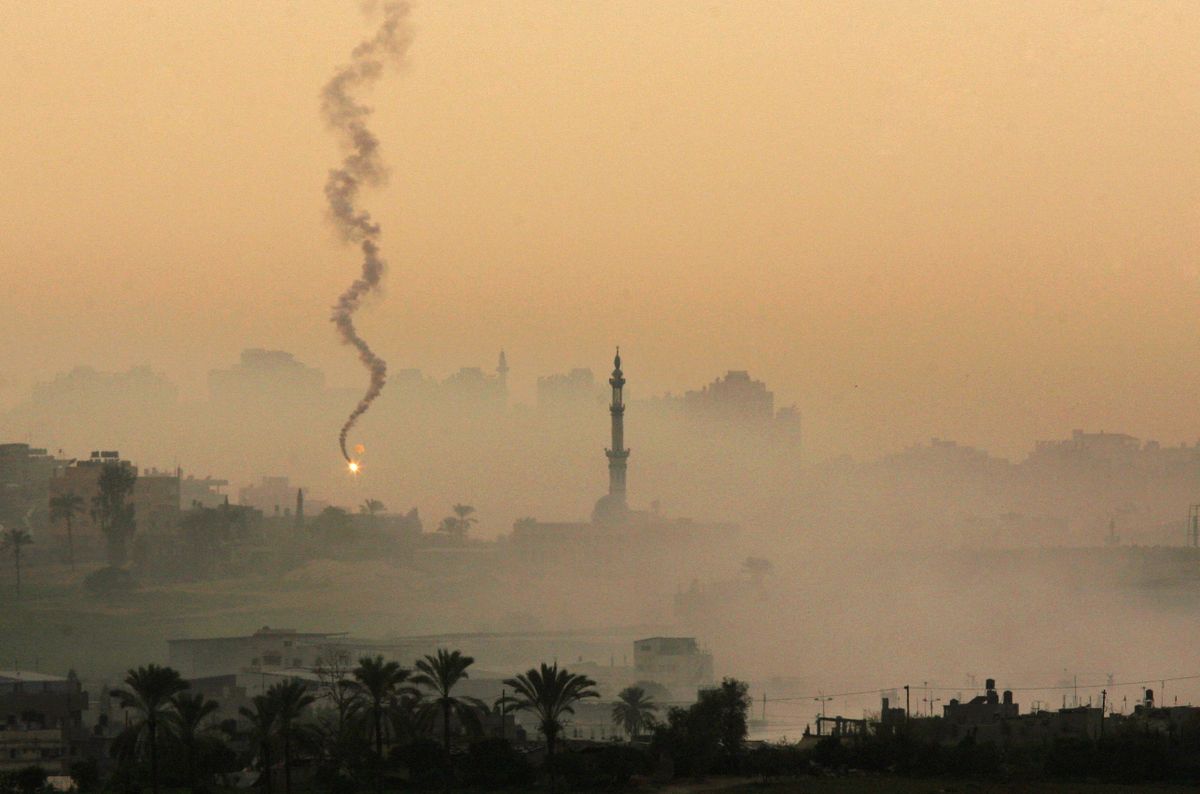Israel to weigh Gaza cease-fire
Hamas leader cool to outline of Egypt-aided pact

JERUSALEM – Israeli leaders said they would meet today to consider approval of an Egypt-brokered cease-fire that would bring to an end their three-week-old assault against Hamas, the armed Islamist movement that controls the Gaza Strip.
As Israel faced harsh censure from some of its friends in the Middle East, including Turkey and Qatar, an Israeli government spokesman said the military operation was “in its final act,” although other officials cautioned that the proposed truce was still fragile.
Israel sent diplomats to Cairo and Washington Friday to negotiate final details of a multifaceted plan that would stop the war largely on Israel’s terms. “There is optimism and things are moving favorably,” said a senior Israeli official.
Exiled Hamas leader Khaled Meshal cast doubt on whether the movement would go along. “We will not accept Israel’s conditions for a cease-fire,” Meshal said during a summit of Arab leaders in Doha, the Qatari capital.
Israeli officials have insisted that Hamas commit to a cease-fire that would endure for at least one year. Israel has also sought assurances from Egypt, the United States and European countries that they will work together to prevent Hamas from rearming and continuing to fire rockets into southern Israel.
In Washington, Israel secured one of its objectives Friday by signing an agreement with the United States designed to help stop the smuggling of weapons into Gaza. Under the pact, signed by Secretary of State Condoleezza Rice and Israeli Foreign Minister Tzipi Livni, the United States pledges to help track and thwart smugglers from supplying Hamas with rockets and other munitions.
Rice told reporters the agreement would be part of a broader international effort – including similar arrangements with European countries – to stem the flow of arms into Gaza.
The U.S.-Israeli deal “should be thought of as one of the elements of trying to bring into being a durable cease-fire,” Rice said. A key element, she said, “is to do something about the weapons smuggling and the potential for resupply of Hamas from other places, including from Iran.”
Israel has imposed a near-total blockade on Gaza since Hamas, which does not recognize Israel’s right to exist and has targeted southern Israel with rockets for years, took exclusive control of the strip in June 2007. Israel withdrew its soldiers and settlers from Gaza in 2005, ending a presence in the territory that began in 1967 when Israeli forces occupied Gaza and the West Bank. Palestinians envision establishing a state in the two territories.
Smugglers have eluded the blockade by digging tunnels under Gaza’s southern border with Egypt, and the Israeli military has said it has blown up hundreds of tunnels in Gaza since the war began Dec. 27. But Israeli officials are worried that smugglers will burrow new routes as soon as the fighting ends. To prevent that, U.S. and Israeli officials have discussed the possibility of constructing an underground barrier along the Egyptian-Gazan border.
State Department spokesman Sean McCormack acknowledged the United States has sent a team from the U.S. Army Corp of Engineers to the region to study the issue. In a news conference, he said the U.S. government has committed money as part of the anti-smuggling effort, but would not say how much.
Livni flew to Washington to sign the deal with Rice, with whom she has formed a close partnership. Livni is a candidate for prime minister in Israel’s elections next month and was looking for a political boost, analysts said. One of her main rivals, Defense Minister Ehud Barak, has seen his popular support climb since the war began.
Winning a deal in Washington, Israel’s closest ally, may have been the easiest part for Israeli diplomats. Egypt has balked at allowing foreigners on its soil to patrol or inspect the Gazan border, though officials in Cairo have said they would welcome more money to help them do the work themselves.